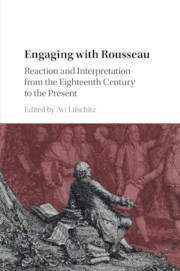
-
Select format
-
- Publisher:
- Cambridge University Press
- Publication date:
- July 2016
- July 2016
- ISBN:
- 9781316536582
- 9781107146327
- 9781108705189
- Dimensions:
- (228 x 152 mm)
- Weight & Pages:
- 0.5kg, 240 Pages
- Dimensions:
- (229 x 152 mm)
- Weight & Pages:
- 0.36kg, 244 Pages
You may already have access via personal or institutional login
Book description
Jean-Jacques Rousseau has been cast as a champion of Enlightenment and a beacon of Romanticism, a father figure of radical revolutionaries and totalitarian dictators alike, an inventor of the modern notion of the self, and an advocate of stern ancient republicanism. Engaging with Rousseau treats his writings as an enduring topic of debate, examining the diverse responses they have attracted from the Enlightenment to the present. Such notions as the general will were, for example, refracted through very different prisms during the struggle for independence in Latin America and in social conflicts in Eastern Europe, or modified by thinkers from Kant to contemporary political theorists. Beyond Rousseau's ideas, his public image too travelled around the world. This book examines engagement with Rousseau's works as well as with his self-fashioning; especially in turbulent times, his defiant public identity and his call for regeneration were admired or despised by intellectuals and political agents.
Contents
Metrics
Altmetric attention score
Full text views
Full text views help Loading metrics...
Loading metrics...
* Views captured on Cambridge Core between #date#. This data will be updated every 24 hours.
Usage data cannot currently be displayed.
Accessibility standard: Unknown
Why this information is here
This section outlines the accessibility features of this content - including support for screen readers, full keyboard navigation and high-contrast display options. This may not be relevant for you.
Accessibility Information
Accessibility compliance for the PDF of this book is currently unknown and may be updated in the future.


